Determining Impact of EHRs on Work Efficiency of Nurses in Acute Care
VerifiedAdded on 2020/11/23
|31
|11747
|412
Thesis and Dissertation
AI Summary
This dissertation investigates the impact of electronic health records (EHRs) on the work efficiency of nurses in acute care settings. It analyzes the benefits of EHRs, such as improved patient care and streamlined workflows, while also examining the barriers to their adoption, including lack of resources and technological complexity. The study reviews relevant literature, including theories such as human relations and systems theory, to understand how EHRs can improve nursing performance. The research encompasses various aspects including rationale, scope, aims, objectives, and research questions, along with a discussion of methodologies, data collection, and ethical considerations. The findings provide insights into how EHRs can enhance nurses' productivity, improve patient outcomes, and address challenges in acute care environments. The study concludes with recommendations for effective EHR implementation and optimization in healthcare settings.
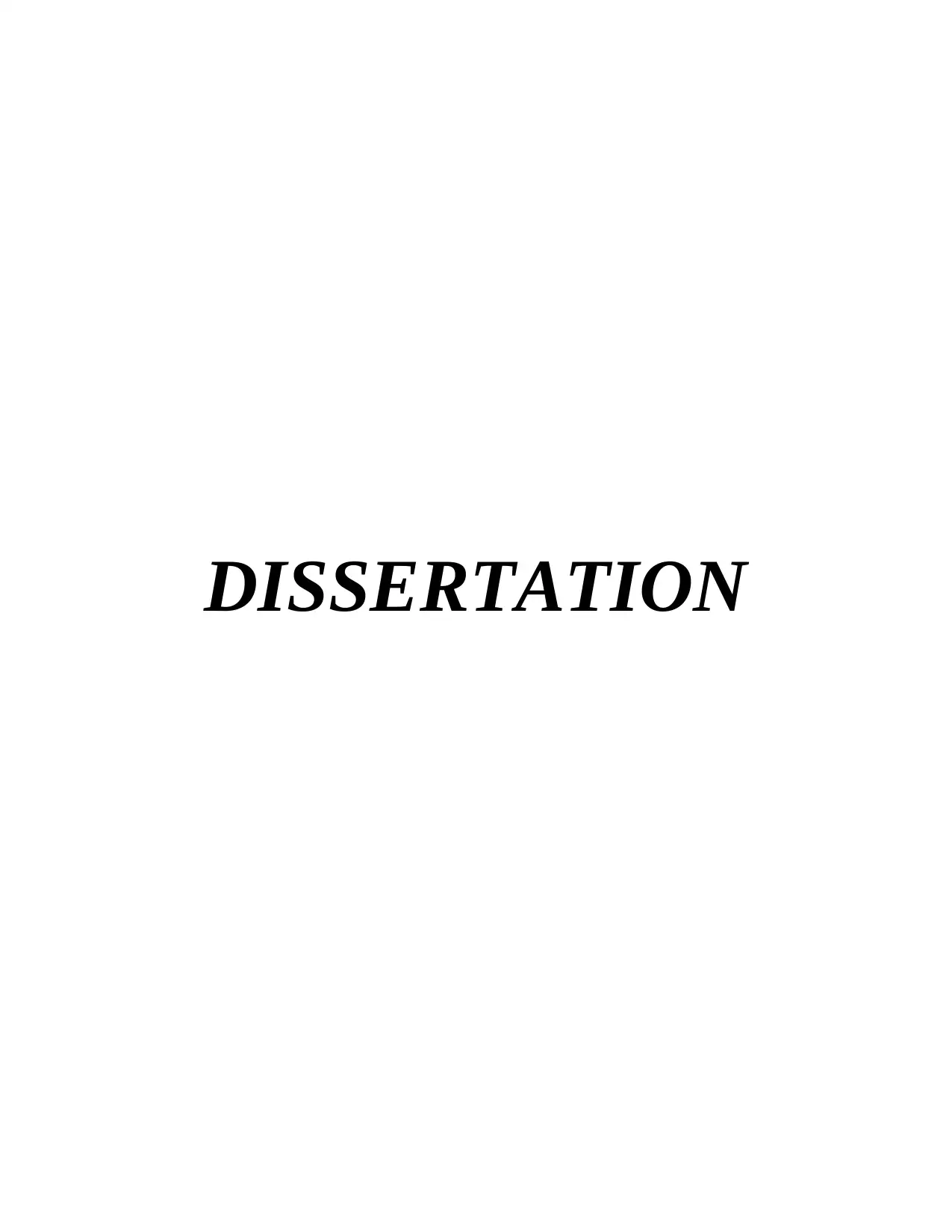
DISSERTATION
Paraphrase This Document
Need a fresh take? Get an instant paraphrase of this document with our AI Paraphraser
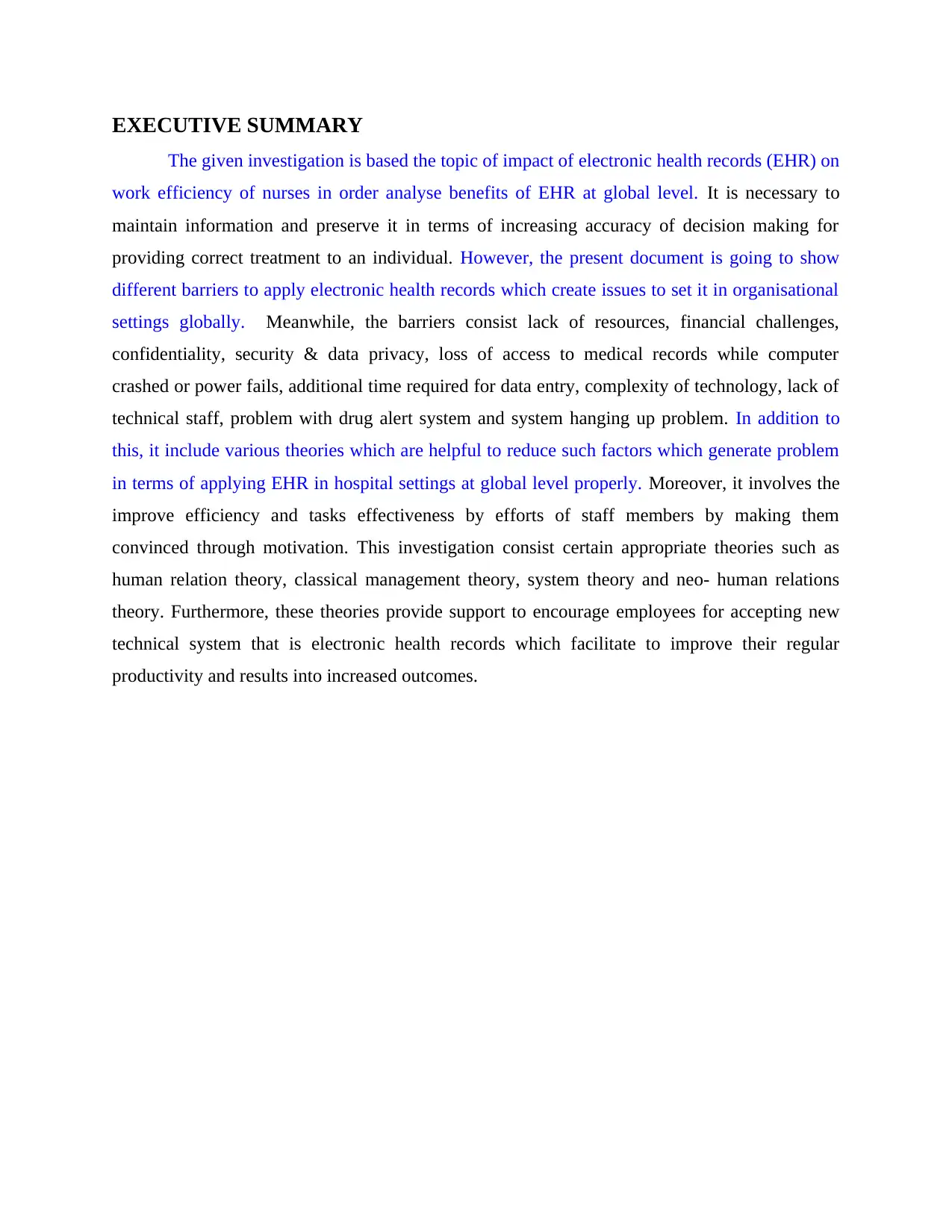
EXECUTIVE SUMMARY
The given investigation is based the topic of impact of electronic health records (EHR) on
work efficiency of nurses in order analyse benefits of EHR at global level. It is necessary to
maintain information and preserve it in terms of increasing accuracy of decision making for
providing correct treatment to an individual. However, the present document is going to show
different barriers to apply electronic health records which create issues to set it in organisational
settings globally. Meanwhile, the barriers consist lack of resources, financial challenges,
confidentiality, security & data privacy, loss of access to medical records while computer
crashed or power fails, additional time required for data entry, complexity of technology, lack of
technical staff, problem with drug alert system and system hanging up problem. In addition to
this, it include various theories which are helpful to reduce such factors which generate problem
in terms of applying EHR in hospital settings at global level properly. Moreover, it involves the
improve efficiency and tasks effectiveness by efforts of staff members by making them
convinced through motivation. This investigation consist certain appropriate theories such as
human relation theory, classical management theory, system theory and neo- human relations
theory. Furthermore, these theories provide support to encourage employees for accepting new
technical system that is electronic health records which facilitate to improve their regular
productivity and results into increased outcomes.
The given investigation is based the topic of impact of electronic health records (EHR) on
work efficiency of nurses in order analyse benefits of EHR at global level. It is necessary to
maintain information and preserve it in terms of increasing accuracy of decision making for
providing correct treatment to an individual. However, the present document is going to show
different barriers to apply electronic health records which create issues to set it in organisational
settings globally. Meanwhile, the barriers consist lack of resources, financial challenges,
confidentiality, security & data privacy, loss of access to medical records while computer
crashed or power fails, additional time required for data entry, complexity of technology, lack of
technical staff, problem with drug alert system and system hanging up problem. In addition to
this, it include various theories which are helpful to reduce such factors which generate problem
in terms of applying EHR in hospital settings at global level properly. Moreover, it involves the
improve efficiency and tasks effectiveness by efforts of staff members by making them
convinced through motivation. This investigation consist certain appropriate theories such as
human relation theory, classical management theory, system theory and neo- human relations
theory. Furthermore, these theories provide support to encourage employees for accepting new
technical system that is electronic health records which facilitate to improve their regular
productivity and results into increased outcomes.
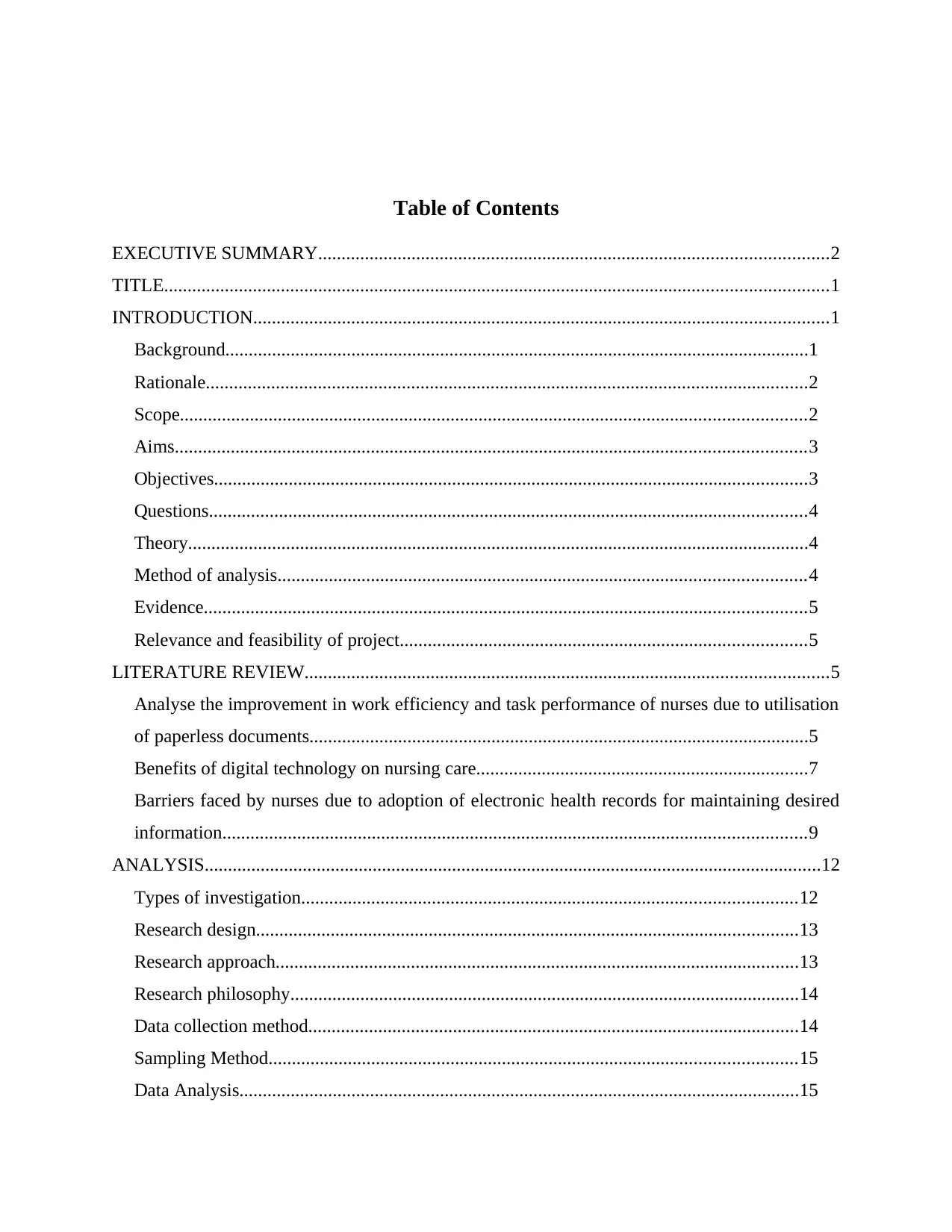
Table of Contents
EXECUTIVE SUMMARY.............................................................................................................2
TITLE..............................................................................................................................................1
INTRODUCTION...........................................................................................................................1
Background.............................................................................................................................1
Rationale.................................................................................................................................2
Scope......................................................................................................................................2
Aims.......................................................................................................................................3
Objectives...............................................................................................................................3
Questions................................................................................................................................4
Theory.....................................................................................................................................4
Method of analysis.................................................................................................................4
Evidence.................................................................................................................................5
Relevance and feasibility of project.......................................................................................5
LITERATURE REVIEW................................................................................................................5
Analyse the improvement in work efficiency and task performance of nurses due to utilisation
of paperless documents...........................................................................................................5
Benefits of digital technology on nursing care.......................................................................7
Barriers faced by nurses due to adoption of electronic health records for maintaining desired
information.............................................................................................................................9
ANALYSIS....................................................................................................................................12
Types of investigation..........................................................................................................12
Research design....................................................................................................................13
Research approach................................................................................................................13
Research philosophy.............................................................................................................14
Data collection method.........................................................................................................14
Sampling Method.................................................................................................................15
Data Analysis........................................................................................................................15
EXECUTIVE SUMMARY.............................................................................................................2
TITLE..............................................................................................................................................1
INTRODUCTION...........................................................................................................................1
Background.............................................................................................................................1
Rationale.................................................................................................................................2
Scope......................................................................................................................................2
Aims.......................................................................................................................................3
Objectives...............................................................................................................................3
Questions................................................................................................................................4
Theory.....................................................................................................................................4
Method of analysis.................................................................................................................4
Evidence.................................................................................................................................5
Relevance and feasibility of project.......................................................................................5
LITERATURE REVIEW................................................................................................................5
Analyse the improvement in work efficiency and task performance of nurses due to utilisation
of paperless documents...........................................................................................................5
Benefits of digital technology on nursing care.......................................................................7
Barriers faced by nurses due to adoption of electronic health records for maintaining desired
information.............................................................................................................................9
ANALYSIS....................................................................................................................................12
Types of investigation..........................................................................................................12
Research design....................................................................................................................13
Research approach................................................................................................................13
Research philosophy.............................................................................................................14
Data collection method.........................................................................................................14
Sampling Method.................................................................................................................15
Data Analysis........................................................................................................................15
⊘ This is a preview!⊘
Do you want full access?
Subscribe today to unlock all pages.

Trusted by 1+ million students worldwide
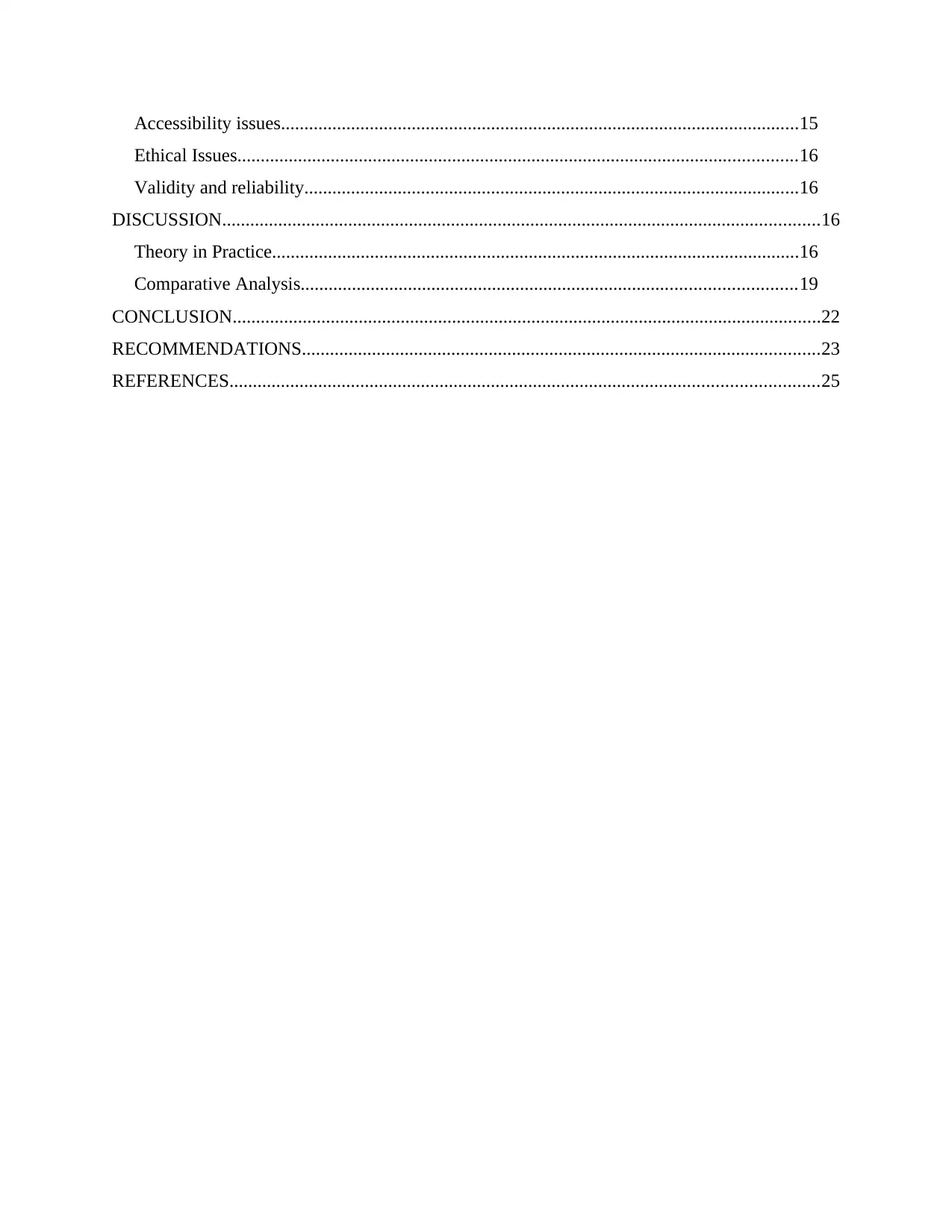
Accessibility issues...............................................................................................................15
Ethical Issues........................................................................................................................16
Validity and reliability..........................................................................................................16
DISCUSSION................................................................................................................................16
Theory in Practice.................................................................................................................16
Comparative Analysis..........................................................................................................19
CONCLUSION..............................................................................................................................22
RECOMMENDATIONS...............................................................................................................23
REFERENCES..............................................................................................................................25
Ethical Issues........................................................................................................................16
Validity and reliability..........................................................................................................16
DISCUSSION................................................................................................................................16
Theory in Practice.................................................................................................................16
Comparative Analysis..........................................................................................................19
CONCLUSION..............................................................................................................................22
RECOMMENDATIONS...............................................................................................................23
REFERENCES..............................................................................................................................25
Paraphrase This Document
Need a fresh take? Get an instant paraphrase of this document with our AI Paraphraser

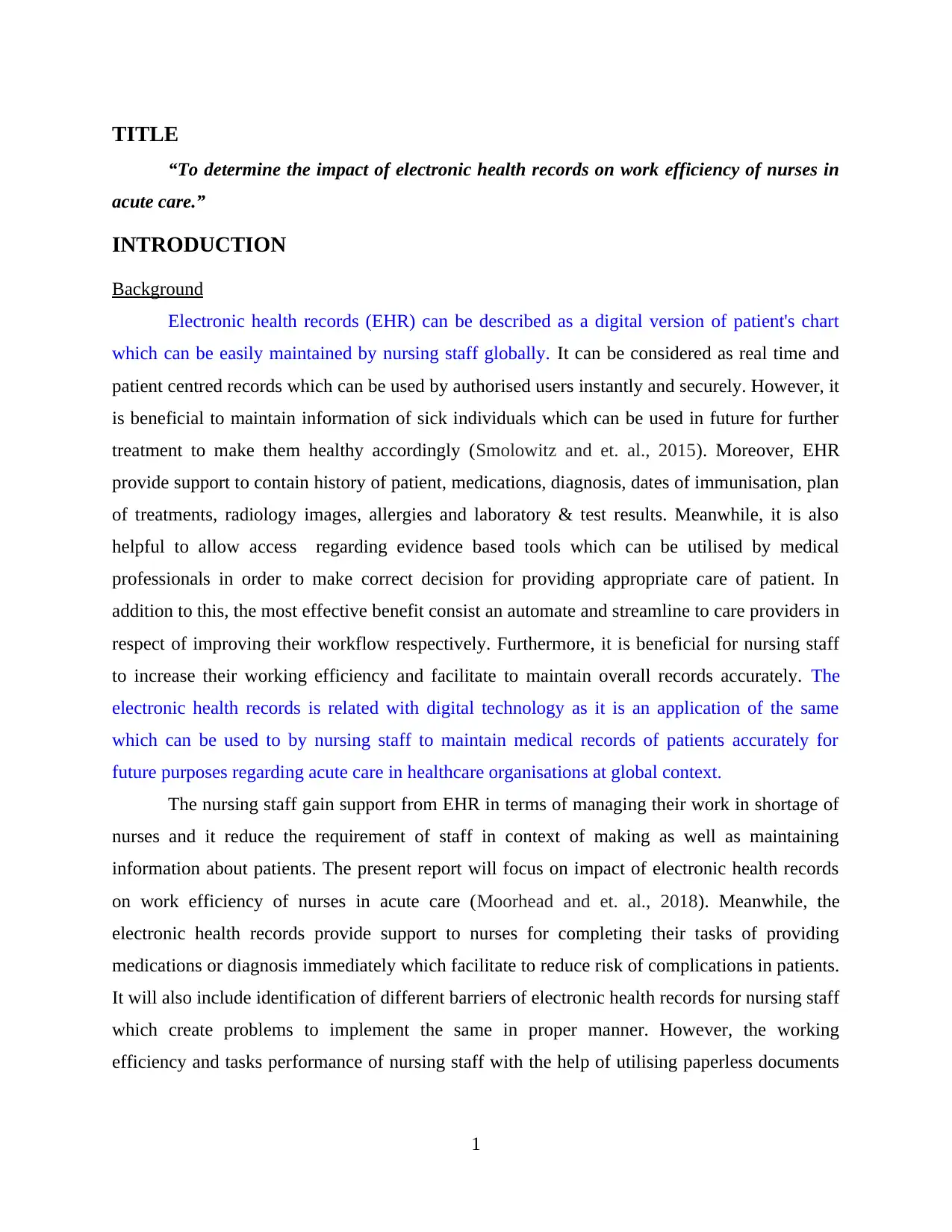
TITLE
“To determine the impact of electronic health records on work efficiency of nurses in
acute care.”
INTRODUCTION
Background
Electronic health records (EHR) can be described as a digital version of patient's chart
which can be easily maintained by nursing staff globally. It can be considered as real time and
patient centred records which can be used by authorised users instantly and securely. However, it
is beneficial to maintain information of sick individuals which can be used in future for further
treatment to make them healthy accordingly (Smolowitz and et. al., 2015). Moreover, EHR
provide support to contain history of patient, medications, diagnosis, dates of immunisation, plan
of treatments, radiology images, allergies and laboratory & test results. Meanwhile, it is also
helpful to allow access regarding evidence based tools which can be utilised by medical
professionals in order to make correct decision for providing appropriate care of patient. In
addition to this, the most effective benefit consist an automate and streamline to care providers in
respect of improving their workflow respectively. Furthermore, it is beneficial for nursing staff
to increase their working efficiency and facilitate to maintain overall records accurately. The
electronic health records is related with digital technology as it is an application of the same
which can be used to by nursing staff to maintain medical records of patients accurately for
future purposes regarding acute care in healthcare organisations at global context.
The nursing staff gain support from EHR in terms of managing their work in shortage of
nurses and it reduce the requirement of staff in context of making as well as maintaining
information about patients. The present report will focus on impact of electronic health records
on work efficiency of nurses in acute care (Moorhead and et. al., 2018). Meanwhile, the
electronic health records provide support to nurses for completing their tasks of providing
medications or diagnosis immediately which facilitate to reduce risk of complications in patients.
It will also include identification of different barriers of electronic health records for nursing staff
which create problems to implement the same in proper manner. However, the working
efficiency and tasks performance of nursing staff with the help of utilising paperless documents
1
“To determine the impact of electronic health records on work efficiency of nurses in
acute care.”
INTRODUCTION
Background
Electronic health records (EHR) can be described as a digital version of patient's chart
which can be easily maintained by nursing staff globally. It can be considered as real time and
patient centred records which can be used by authorised users instantly and securely. However, it
is beneficial to maintain information of sick individuals which can be used in future for further
treatment to make them healthy accordingly (Smolowitz and et. al., 2015). Moreover, EHR
provide support to contain history of patient, medications, diagnosis, dates of immunisation, plan
of treatments, radiology images, allergies and laboratory & test results. Meanwhile, it is also
helpful to allow access regarding evidence based tools which can be utilised by medical
professionals in order to make correct decision for providing appropriate care of patient. In
addition to this, the most effective benefit consist an automate and streamline to care providers in
respect of improving their workflow respectively. Furthermore, it is beneficial for nursing staff
to increase their working efficiency and facilitate to maintain overall records accurately. The
electronic health records is related with digital technology as it is an application of the same
which can be used to by nursing staff to maintain medical records of patients accurately for
future purposes regarding acute care in healthcare organisations at global context.
The nursing staff gain support from EHR in terms of managing their work in shortage of
nurses and it reduce the requirement of staff in context of making as well as maintaining
information about patients. The present report will focus on impact of electronic health records
on work efficiency of nurses in acute care (Moorhead and et. al., 2018). Meanwhile, the
electronic health records provide support to nurses for completing their tasks of providing
medications or diagnosis immediately which facilitate to reduce risk of complications in patients.
It will also include identification of different barriers of electronic health records for nursing staff
which create problems to implement the same in proper manner. However, the working
efficiency and tasks performance of nursing staff with the help of utilising paperless documents
1
⊘ This is a preview!⊘
Do you want full access?
Subscribe today to unlock all pages.

Trusted by 1+ million students worldwide
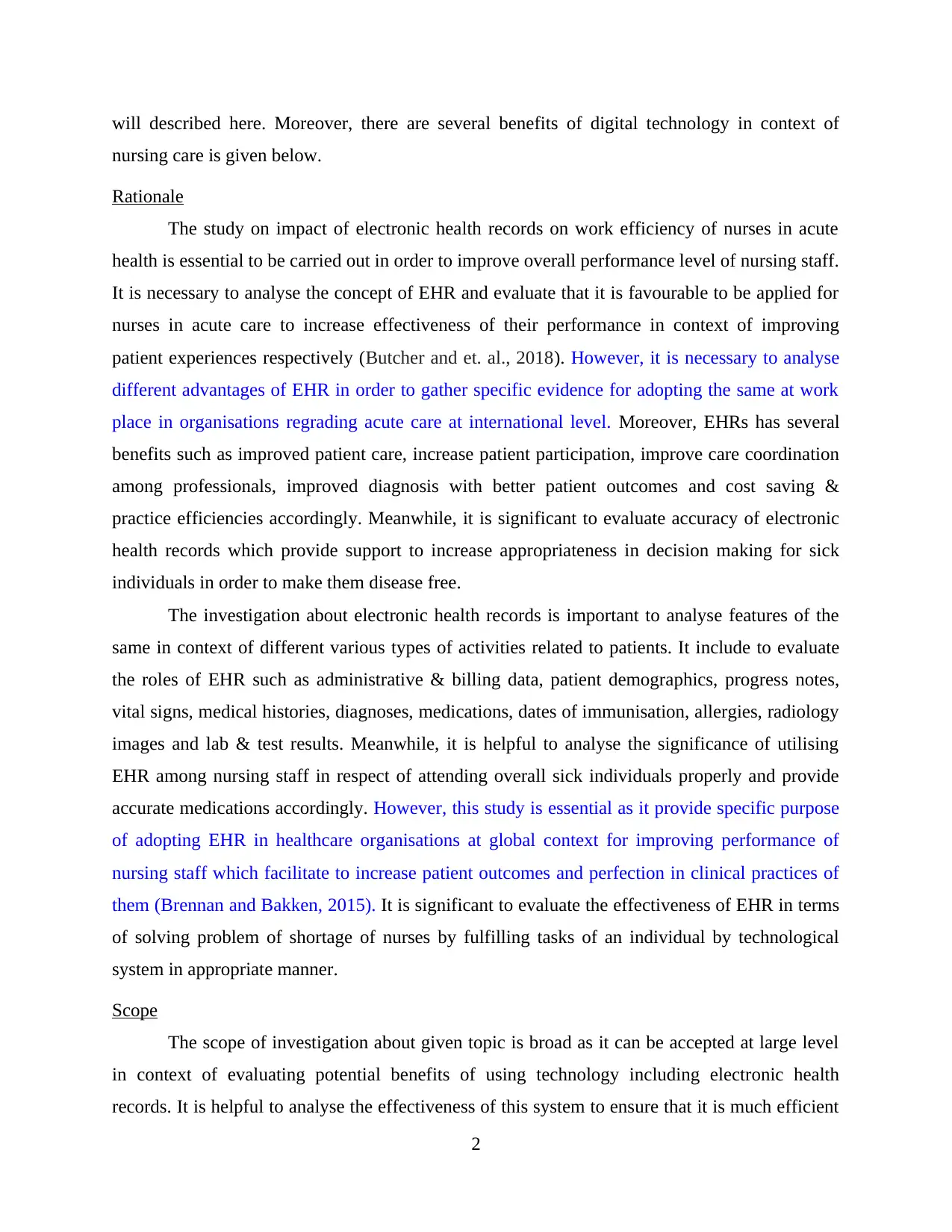
will described here. Moreover, there are several benefits of digital technology in context of
nursing care is given below.
Rationale
The study on impact of electronic health records on work efficiency of nurses in acute
health is essential to be carried out in order to improve overall performance level of nursing staff.
It is necessary to analyse the concept of EHR and evaluate that it is favourable to be applied for
nurses in acute care to increase effectiveness of their performance in context of improving
patient experiences respectively (Butcher and et. al., 2018). However, it is necessary to analyse
different advantages of EHR in order to gather specific evidence for adopting the same at work
place in organisations regrading acute care at international level. Moreover, EHRs has several
benefits such as improved patient care, increase patient participation, improve care coordination
among professionals, improved diagnosis with better patient outcomes and cost saving &
practice efficiencies accordingly. Meanwhile, it is significant to evaluate accuracy of electronic
health records which provide support to increase appropriateness in decision making for sick
individuals in order to make them disease free.
The investigation about electronic health records is important to analyse features of the
same in context of different various types of activities related to patients. It include to evaluate
the roles of EHR such as administrative & billing data, patient demographics, progress notes,
vital signs, medical histories, diagnoses, medications, dates of immunisation, allergies, radiology
images and lab & test results. Meanwhile, it is helpful to analyse the significance of utilising
EHR among nursing staff in respect of attending overall sick individuals properly and provide
accurate medications accordingly. However, this study is essential as it provide specific purpose
of adopting EHR in healthcare organisations at global context for improving performance of
nursing staff which facilitate to increase patient outcomes and perfection in clinical practices of
them (Brennan and Bakken, 2015). It is significant to evaluate the effectiveness of EHR in terms
of solving problem of shortage of nurses by fulfilling tasks of an individual by technological
system in appropriate manner.
Scope
The scope of investigation about given topic is broad as it can be accepted at large level
in context of evaluating potential benefits of using technology including electronic health
records. It is helpful to analyse the effectiveness of this system to ensure that it is much efficient
2
nursing care is given below.
Rationale
The study on impact of electronic health records on work efficiency of nurses in acute
health is essential to be carried out in order to improve overall performance level of nursing staff.
It is necessary to analyse the concept of EHR and evaluate that it is favourable to be applied for
nurses in acute care to increase effectiveness of their performance in context of improving
patient experiences respectively (Butcher and et. al., 2018). However, it is necessary to analyse
different advantages of EHR in order to gather specific evidence for adopting the same at work
place in organisations regrading acute care at international level. Moreover, EHRs has several
benefits such as improved patient care, increase patient participation, improve care coordination
among professionals, improved diagnosis with better patient outcomes and cost saving &
practice efficiencies accordingly. Meanwhile, it is significant to evaluate accuracy of electronic
health records which provide support to increase appropriateness in decision making for sick
individuals in order to make them disease free.
The investigation about electronic health records is important to analyse features of the
same in context of different various types of activities related to patients. It include to evaluate
the roles of EHR such as administrative & billing data, patient demographics, progress notes,
vital signs, medical histories, diagnoses, medications, dates of immunisation, allergies, radiology
images and lab & test results. Meanwhile, it is helpful to analyse the significance of utilising
EHR among nursing staff in respect of attending overall sick individuals properly and provide
accurate medications accordingly. However, this study is essential as it provide specific purpose
of adopting EHR in healthcare organisations at global context for improving performance of
nursing staff which facilitate to increase patient outcomes and perfection in clinical practices of
them (Brennan and Bakken, 2015). It is significant to evaluate the effectiveness of EHR in terms
of solving problem of shortage of nurses by fulfilling tasks of an individual by technological
system in appropriate manner.
Scope
The scope of investigation about given topic is broad as it can be accepted at large level
in context of evaluating potential benefits of using technology including electronic health
records. It is helpful to analyse the effectiveness of this system to ensure that it is much efficient
2
Paraphrase This Document
Need a fresh take? Get an instant paraphrase of this document with our AI Paraphraser
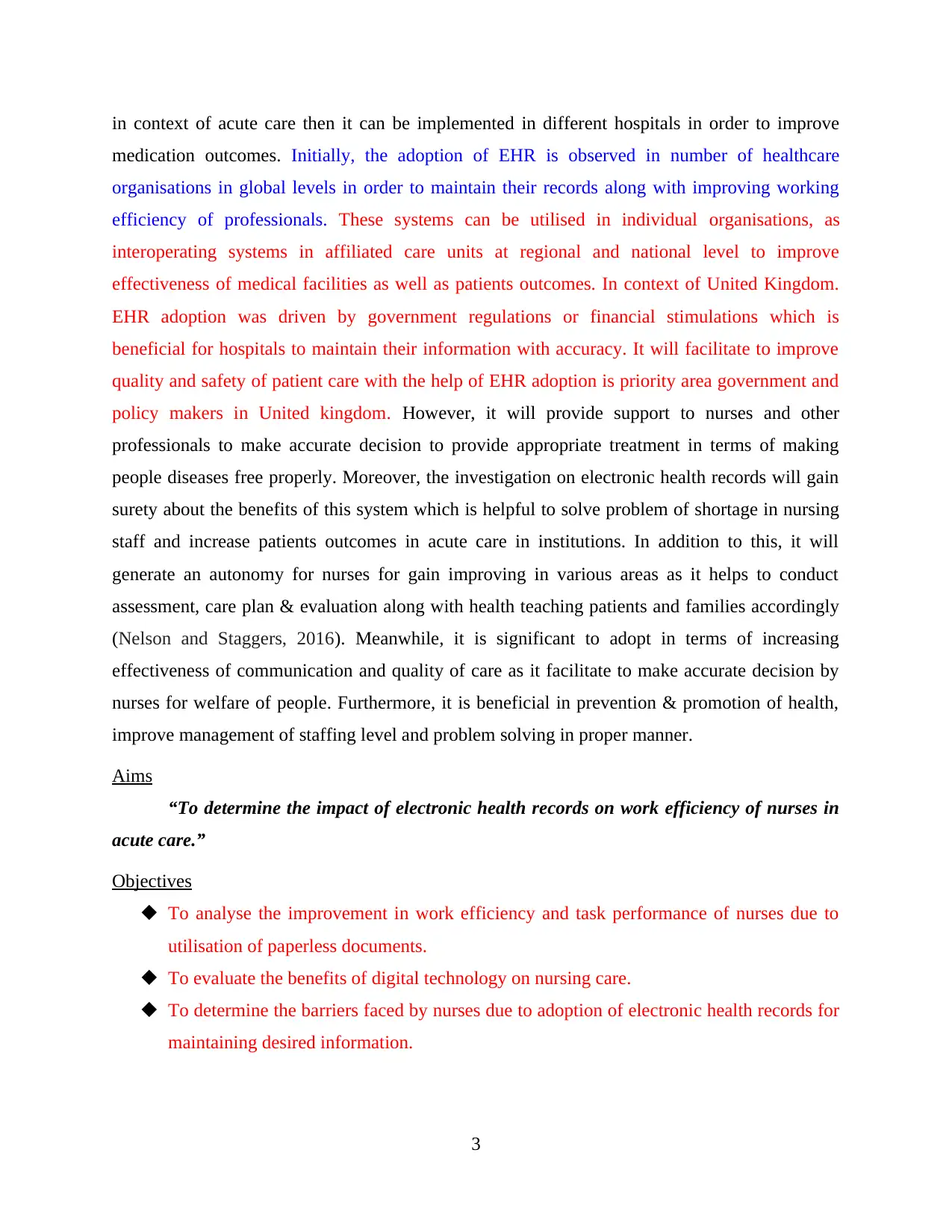
in context of acute care then it can be implemented in different hospitals in order to improve
medication outcomes. Initially, the adoption of EHR is observed in number of healthcare
organisations in global levels in order to maintain their records along with improving working
efficiency of professionals. These systems can be utilised in individual organisations, as
interoperating systems in affiliated care units at regional and national level to improve
effectiveness of medical facilities as well as patients outcomes. In context of United Kingdom.
EHR adoption was driven by government regulations or financial stimulations which is
beneficial for hospitals to maintain their information with accuracy. It will facilitate to improve
quality and safety of patient care with the help of EHR adoption is priority area government and
policy makers in United kingdom. However, it will provide support to nurses and other
professionals to make accurate decision to provide appropriate treatment in terms of making
people diseases free properly. Moreover, the investigation on electronic health records will gain
surety about the benefits of this system which is helpful to solve problem of shortage in nursing
staff and increase patients outcomes in acute care in institutions. In addition to this, it will
generate an autonomy for nurses for gain improving in various areas as it helps to conduct
assessment, care plan & evaluation along with health teaching patients and families accordingly
(Nelson and Staggers, 2016). Meanwhile, it is significant to adopt in terms of increasing
effectiveness of communication and quality of care as it facilitate to make accurate decision by
nurses for welfare of people. Furthermore, it is beneficial in prevention & promotion of health,
improve management of staffing level and problem solving in proper manner.
Aims
“To determine the impact of electronic health records on work efficiency of nurses in
acute care.”
Objectives
To analyse the improvement in work efficiency and task performance of nurses due to
utilisation of paperless documents.
To evaluate the benefits of digital technology on nursing care.
To determine the barriers faced by nurses due to adoption of electronic health records for
maintaining desired information.
3
medication outcomes. Initially, the adoption of EHR is observed in number of healthcare
organisations in global levels in order to maintain their records along with improving working
efficiency of professionals. These systems can be utilised in individual organisations, as
interoperating systems in affiliated care units at regional and national level to improve
effectiveness of medical facilities as well as patients outcomes. In context of United Kingdom.
EHR adoption was driven by government regulations or financial stimulations which is
beneficial for hospitals to maintain their information with accuracy. It will facilitate to improve
quality and safety of patient care with the help of EHR adoption is priority area government and
policy makers in United kingdom. However, it will provide support to nurses and other
professionals to make accurate decision to provide appropriate treatment in terms of making
people diseases free properly. Moreover, the investigation on electronic health records will gain
surety about the benefits of this system which is helpful to solve problem of shortage in nursing
staff and increase patients outcomes in acute care in institutions. In addition to this, it will
generate an autonomy for nurses for gain improving in various areas as it helps to conduct
assessment, care plan & evaluation along with health teaching patients and families accordingly
(Nelson and Staggers, 2016). Meanwhile, it is significant to adopt in terms of increasing
effectiveness of communication and quality of care as it facilitate to make accurate decision by
nurses for welfare of people. Furthermore, it is beneficial in prevention & promotion of health,
improve management of staffing level and problem solving in proper manner.
Aims
“To determine the impact of electronic health records on work efficiency of nurses in
acute care.”
Objectives
To analyse the improvement in work efficiency and task performance of nurses due to
utilisation of paperless documents.
To evaluate the benefits of digital technology on nursing care.
To determine the barriers faced by nurses due to adoption of electronic health records for
maintaining desired information.
3
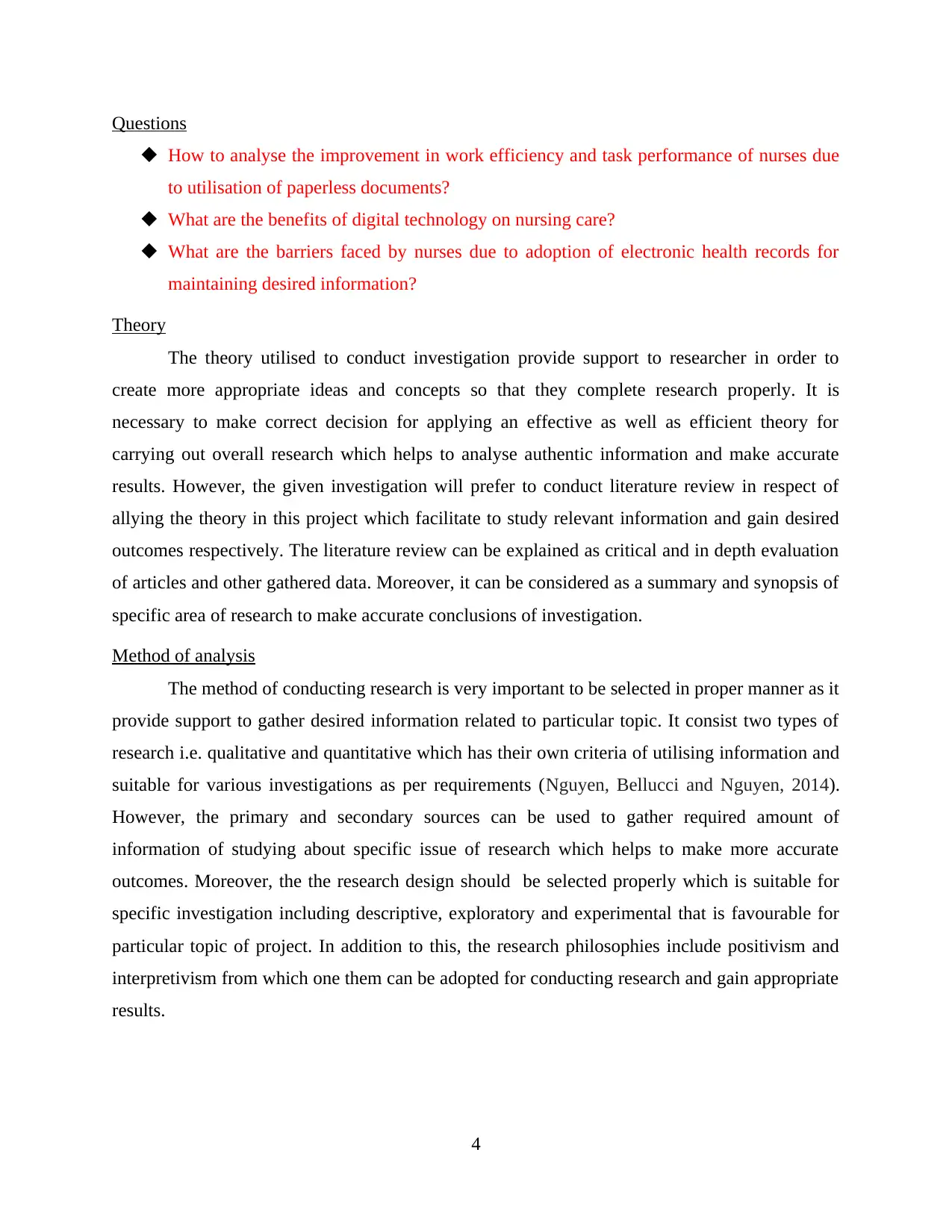
Questions
How to analyse the improvement in work efficiency and task performance of nurses due
to utilisation of paperless documents?
What are the benefits of digital technology on nursing care?
What are the barriers faced by nurses due to adoption of electronic health records for
maintaining desired information?
Theory
The theory utilised to conduct investigation provide support to researcher in order to
create more appropriate ideas and concepts so that they complete research properly. It is
necessary to make correct decision for applying an effective as well as efficient theory for
carrying out overall research which helps to analyse authentic information and make accurate
results. However, the given investigation will prefer to conduct literature review in respect of
allying the theory in this project which facilitate to study relevant information and gain desired
outcomes respectively. The literature review can be explained as critical and in depth evaluation
of articles and other gathered data. Moreover, it can be considered as a summary and synopsis of
specific area of research to make accurate conclusions of investigation.
Method of analysis
The method of conducting research is very important to be selected in proper manner as it
provide support to gather desired information related to particular topic. It consist two types of
research i.e. qualitative and quantitative which has their own criteria of utilising information and
suitable for various investigations as per requirements (Nguyen, Bellucci and Nguyen, 2014).
However, the primary and secondary sources can be used to gather required amount of
information of studying about specific issue of research which helps to make more accurate
outcomes. Moreover, the the research design should be selected properly which is suitable for
specific investigation including descriptive, exploratory and experimental that is favourable for
particular topic of project. In addition to this, the research philosophies include positivism and
interpretivism from which one them can be adopted for conducting research and gain appropriate
results.
4
How to analyse the improvement in work efficiency and task performance of nurses due
to utilisation of paperless documents?
What are the benefits of digital technology on nursing care?
What are the barriers faced by nurses due to adoption of electronic health records for
maintaining desired information?
Theory
The theory utilised to conduct investigation provide support to researcher in order to
create more appropriate ideas and concepts so that they complete research properly. It is
necessary to make correct decision for applying an effective as well as efficient theory for
carrying out overall research which helps to analyse authentic information and make accurate
results. However, the given investigation will prefer to conduct literature review in respect of
allying the theory in this project which facilitate to study relevant information and gain desired
outcomes respectively. The literature review can be explained as critical and in depth evaluation
of articles and other gathered data. Moreover, it can be considered as a summary and synopsis of
specific area of research to make accurate conclusions of investigation.
Method of analysis
The method of conducting research is very important to be selected in proper manner as it
provide support to gather desired information related to particular topic. It consist two types of
research i.e. qualitative and quantitative which has their own criteria of utilising information and
suitable for various investigations as per requirements (Nguyen, Bellucci and Nguyen, 2014).
However, the primary and secondary sources can be used to gather required amount of
information of studying about specific issue of research which helps to make more accurate
outcomes. Moreover, the the research design should be selected properly which is suitable for
specific investigation including descriptive, exploratory and experimental that is favourable for
particular topic of project. In addition to this, the research philosophies include positivism and
interpretivism from which one them can be adopted for conducting research and gain appropriate
results.
4
⊘ This is a preview!⊘
Do you want full access?
Subscribe today to unlock all pages.

Trusted by 1+ million students worldwide
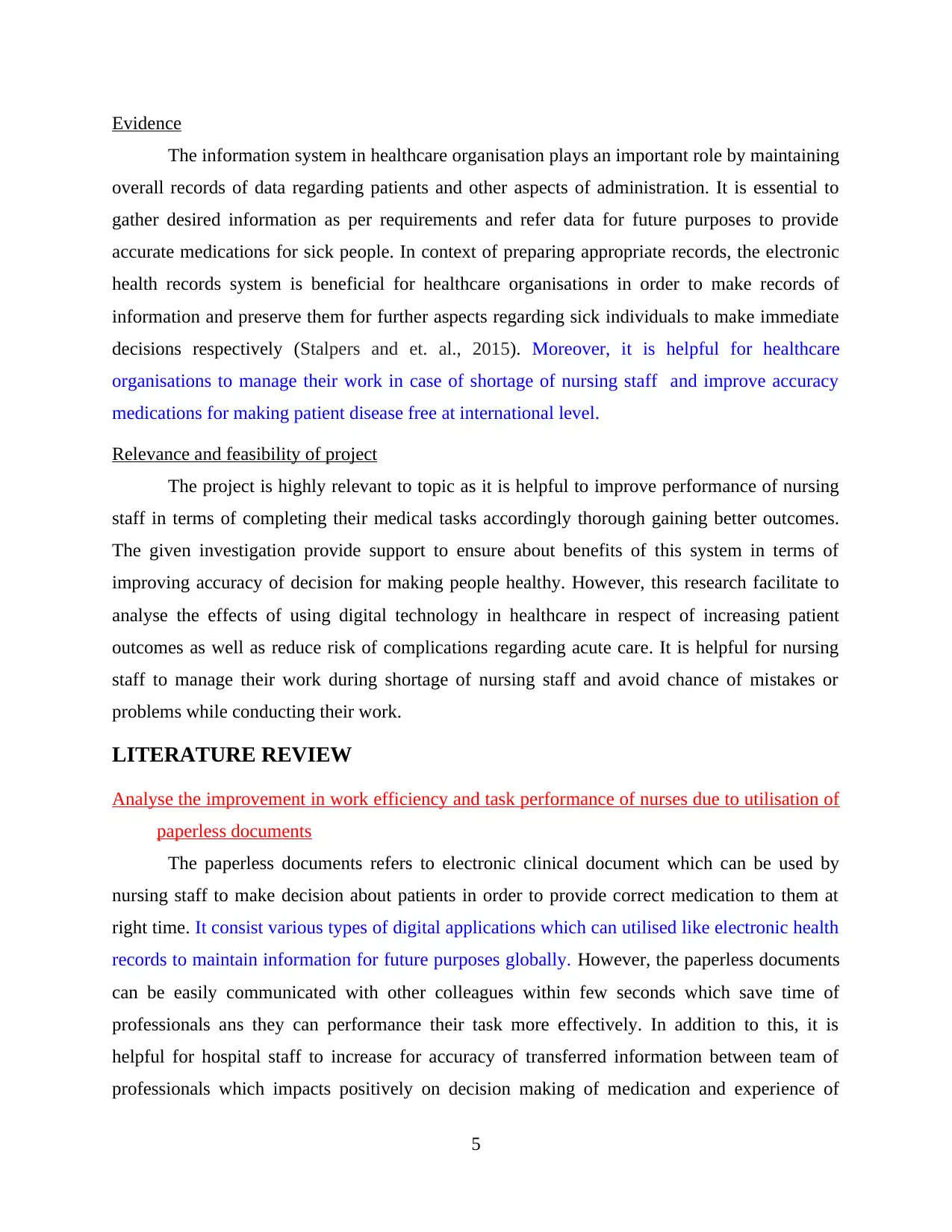
Evidence
The information system in healthcare organisation plays an important role by maintaining
overall records of data regarding patients and other aspects of administration. It is essential to
gather desired information as per requirements and refer data for future purposes to provide
accurate medications for sick people. In context of preparing appropriate records, the electronic
health records system is beneficial for healthcare organisations in order to make records of
information and preserve them for further aspects regarding sick individuals to make immediate
decisions respectively (Stalpers and et. al., 2015). Moreover, it is helpful for healthcare
organisations to manage their work in case of shortage of nursing staff and improve accuracy
medications for making patient disease free at international level.
Relevance and feasibility of project
The project is highly relevant to topic as it is helpful to improve performance of nursing
staff in terms of completing their medical tasks accordingly thorough gaining better outcomes.
The given investigation provide support to ensure about benefits of this system in terms of
improving accuracy of decision for making people healthy. However, this research facilitate to
analyse the effects of using digital technology in healthcare in respect of increasing patient
outcomes as well as reduce risk of complications regarding acute care. It is helpful for nursing
staff to manage their work during shortage of nursing staff and avoid chance of mistakes or
problems while conducting their work.
LITERATURE REVIEW
Analyse the improvement in work efficiency and task performance of nurses due to utilisation of
paperless documents
The paperless documents refers to electronic clinical document which can be used by
nursing staff to make decision about patients in order to provide correct medication to them at
right time. It consist various types of digital applications which can utilised like electronic health
records to maintain information for future purposes globally. However, the paperless documents
can be easily communicated with other colleagues within few seconds which save time of
professionals ans they can performance their task more effectively. In addition to this, it is
helpful for hospital staff to increase for accuracy of transferred information between team of
professionals which impacts positively on decision making of medication and experience of
5
The information system in healthcare organisation plays an important role by maintaining
overall records of data regarding patients and other aspects of administration. It is essential to
gather desired information as per requirements and refer data for future purposes to provide
accurate medications for sick people. In context of preparing appropriate records, the electronic
health records system is beneficial for healthcare organisations in order to make records of
information and preserve them for further aspects regarding sick individuals to make immediate
decisions respectively (Stalpers and et. al., 2015). Moreover, it is helpful for healthcare
organisations to manage their work in case of shortage of nursing staff and improve accuracy
medications for making patient disease free at international level.
Relevance and feasibility of project
The project is highly relevant to topic as it is helpful to improve performance of nursing
staff in terms of completing their medical tasks accordingly thorough gaining better outcomes.
The given investigation provide support to ensure about benefits of this system in terms of
improving accuracy of decision for making people healthy. However, this research facilitate to
analyse the effects of using digital technology in healthcare in respect of increasing patient
outcomes as well as reduce risk of complications regarding acute care. It is helpful for nursing
staff to manage their work during shortage of nursing staff and avoid chance of mistakes or
problems while conducting their work.
LITERATURE REVIEW
Analyse the improvement in work efficiency and task performance of nurses due to utilisation of
paperless documents
The paperless documents refers to electronic clinical document which can be used by
nursing staff to make decision about patients in order to provide correct medication to them at
right time. It consist various types of digital applications which can utilised like electronic health
records to maintain information for future purposes globally. However, the paperless documents
can be easily communicated with other colleagues within few seconds which save time of
professionals ans they can performance their task more effectively. In addition to this, it is
helpful for hospital staff to increase for accuracy of transferred information between team of
professionals which impacts positively on decision making of medication and experience of
5
Paraphrase This Document
Need a fresh take? Get an instant paraphrase of this document with our AI Paraphraser
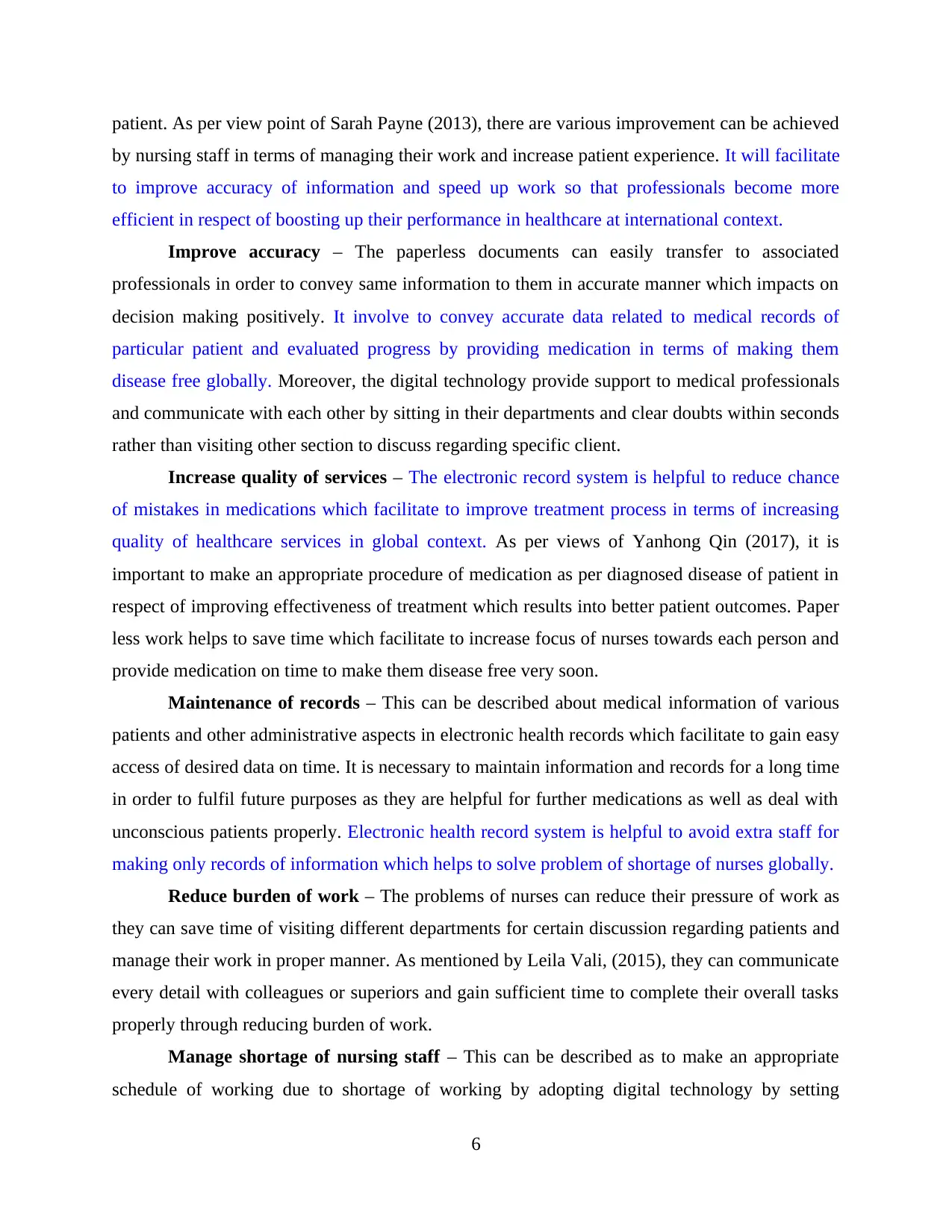
patient. As per view point of Sarah Payne (2013), there are various improvement can be achieved
by nursing staff in terms of managing their work and increase patient experience. It will facilitate
to improve accuracy of information and speed up work so that professionals become more
efficient in respect of boosting up their performance in healthcare at international context.
Improve accuracy – The paperless documents can easily transfer to associated
professionals in order to convey same information to them in accurate manner which impacts on
decision making positively. It involve to convey accurate data related to medical records of
particular patient and evaluated progress by providing medication in terms of making them
disease free globally. Moreover, the digital technology provide support to medical professionals
and communicate with each other by sitting in their departments and clear doubts within seconds
rather than visiting other section to discuss regarding specific client.
Increase quality of services – The electronic record system is helpful to reduce chance
of mistakes in medications which facilitate to improve treatment process in terms of increasing
quality of healthcare services in global context. As per views of Yanhong Qin (2017), it is
important to make an appropriate procedure of medication as per diagnosed disease of patient in
respect of improving effectiveness of treatment which results into better patient outcomes. Paper
less work helps to save time which facilitate to increase focus of nurses towards each person and
provide medication on time to make them disease free very soon.
Maintenance of records – This can be described about medical information of various
patients and other administrative aspects in electronic health records which facilitate to gain easy
access of desired data on time. It is necessary to maintain information and records for a long time
in order to fulfil future purposes as they are helpful for further medications as well as deal with
unconscious patients properly. Electronic health record system is helpful to avoid extra staff for
making only records of information which helps to solve problem of shortage of nurses globally.
Reduce burden of work – The problems of nurses can reduce their pressure of work as
they can save time of visiting different departments for certain discussion regarding patients and
manage their work in proper manner. As mentioned by Leila Vali, (2015), they can communicate
every detail with colleagues or superiors and gain sufficient time to complete their overall tasks
properly through reducing burden of work.
Manage shortage of nursing staff – This can be described as to make an appropriate
schedule of working due to shortage of working by adopting digital technology by setting
6
by nursing staff in terms of managing their work and increase patient experience. It will facilitate
to improve accuracy of information and speed up work so that professionals become more
efficient in respect of boosting up their performance in healthcare at international context.
Improve accuracy – The paperless documents can easily transfer to associated
professionals in order to convey same information to them in accurate manner which impacts on
decision making positively. It involve to convey accurate data related to medical records of
particular patient and evaluated progress by providing medication in terms of making them
disease free globally. Moreover, the digital technology provide support to medical professionals
and communicate with each other by sitting in their departments and clear doubts within seconds
rather than visiting other section to discuss regarding specific client.
Increase quality of services – The electronic record system is helpful to reduce chance
of mistakes in medications which facilitate to improve treatment process in terms of increasing
quality of healthcare services in global context. As per views of Yanhong Qin (2017), it is
important to make an appropriate procedure of medication as per diagnosed disease of patient in
respect of improving effectiveness of treatment which results into better patient outcomes. Paper
less work helps to save time which facilitate to increase focus of nurses towards each person and
provide medication on time to make them disease free very soon.
Maintenance of records – This can be described about medical information of various
patients and other administrative aspects in electronic health records which facilitate to gain easy
access of desired data on time. It is necessary to maintain information and records for a long time
in order to fulfil future purposes as they are helpful for further medications as well as deal with
unconscious patients properly. Electronic health record system is helpful to avoid extra staff for
making only records of information which helps to solve problem of shortage of nurses globally.
Reduce burden of work – The problems of nurses can reduce their pressure of work as
they can save time of visiting different departments for certain discussion regarding patients and
manage their work in proper manner. As mentioned by Leila Vali, (2015), they can communicate
every detail with colleagues or superiors and gain sufficient time to complete their overall tasks
properly through reducing burden of work.
Manage shortage of nursing staff – This can be described as to make an appropriate
schedule of working due to shortage of working by adopting digital technology by setting
6
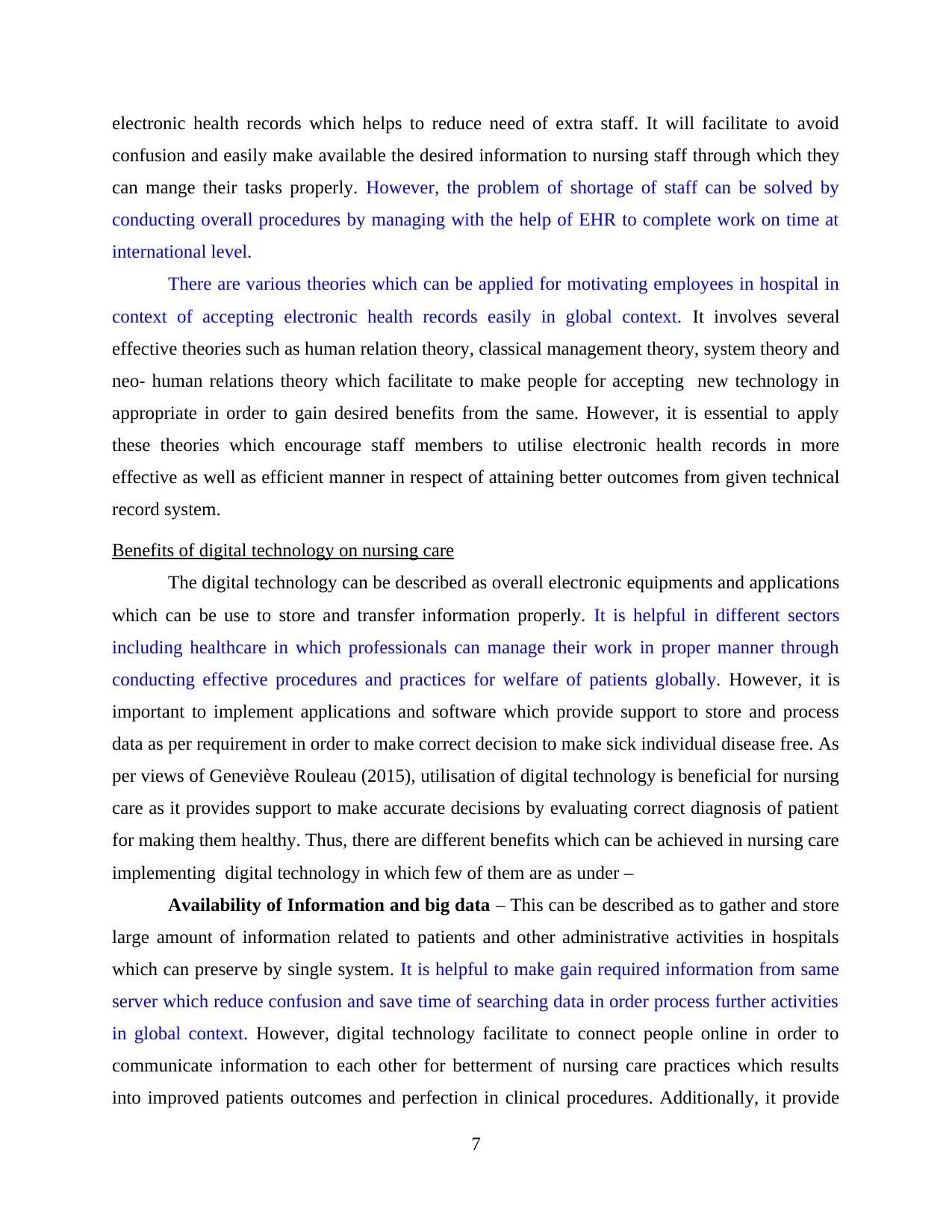
electronic health records which helps to reduce need of extra staff. It will facilitate to avoid
confusion and easily make available the desired information to nursing staff through which they
can mange their tasks properly. However, the problem of shortage of staff can be solved by
conducting overall procedures by managing with the help of EHR to complete work on time at
international level.
There are various theories which can be applied for motivating employees in hospital in
context of accepting electronic health records easily in global context. It involves several
effective theories such as human relation theory, classical management theory, system theory and
neo- human relations theory which facilitate to make people for accepting new technology in
appropriate in order to gain desired benefits from the same. However, it is essential to apply
these theories which encourage staff members to utilise electronic health records in more
effective as well as efficient manner in respect of attaining better outcomes from given technical
record system.
Benefits of digital technology on nursing care
The digital technology can be described as overall electronic equipments and applications
which can be use to store and transfer information properly. It is helpful in different sectors
including healthcare in which professionals can manage their work in proper manner through
conducting effective procedures and practices for welfare of patients globally. However, it is
important to implement applications and software which provide support to store and process
data as per requirement in order to make correct decision to make sick individual disease free. As
per views of Geneviève Rouleau (2015), utilisation of digital technology is beneficial for nursing
care as it provides support to make accurate decisions by evaluating correct diagnosis of patient
for making them healthy. Thus, there are different benefits which can be achieved in nursing care
implementing digital technology in which few of them are as under –
Availability of Information and big data – This can be described as to gather and store
large amount of information related to patients and other administrative activities in hospitals
which can preserve by single system. It is helpful to make gain required information from same
server which reduce confusion and save time of searching data in order process further activities
in global context. However, digital technology facilitate to connect people online in order to
communicate information to each other for betterment of nursing care practices which results
into improved patients outcomes and perfection in clinical procedures. Additionally, it provide
7
confusion and easily make available the desired information to nursing staff through which they
can mange their tasks properly. However, the problem of shortage of staff can be solved by
conducting overall procedures by managing with the help of EHR to complete work on time at
international level.
There are various theories which can be applied for motivating employees in hospital in
context of accepting electronic health records easily in global context. It involves several
effective theories such as human relation theory, classical management theory, system theory and
neo- human relations theory which facilitate to make people for accepting new technology in
appropriate in order to gain desired benefits from the same. However, it is essential to apply
these theories which encourage staff members to utilise electronic health records in more
effective as well as efficient manner in respect of attaining better outcomes from given technical
record system.
Benefits of digital technology on nursing care
The digital technology can be described as overall electronic equipments and applications
which can be use to store and transfer information properly. It is helpful in different sectors
including healthcare in which professionals can manage their work in proper manner through
conducting effective procedures and practices for welfare of patients globally. However, it is
important to implement applications and software which provide support to store and process
data as per requirement in order to make correct decision to make sick individual disease free. As
per views of Geneviève Rouleau (2015), utilisation of digital technology is beneficial for nursing
care as it provides support to make accurate decisions by evaluating correct diagnosis of patient
for making them healthy. Thus, there are different benefits which can be achieved in nursing care
implementing digital technology in which few of them are as under –
Availability of Information and big data – This can be described as to gather and store
large amount of information related to patients and other administrative activities in hospitals
which can preserve by single system. It is helpful to make gain required information from same
server which reduce confusion and save time of searching data in order process further activities
in global context. However, digital technology facilitate to connect people online in order to
communicate information to each other for betterment of nursing care practices which results
into improved patients outcomes and perfection in clinical procedures. Additionally, it provide
7
⊘ This is a preview!⊘
Do you want full access?
Subscribe today to unlock all pages.

Trusted by 1+ million students worldwide
1 out of 31
Related Documents
Your All-in-One AI-Powered Toolkit for Academic Success.
+13062052269
info@desklib.com
Available 24*7 on WhatsApp / Email
![[object Object]](/_next/static/media/star-bottom.7253800d.svg)
Unlock your academic potential
Copyright © 2020–2025 A2Z Services. All Rights Reserved. Developed and managed by ZUCOL.





